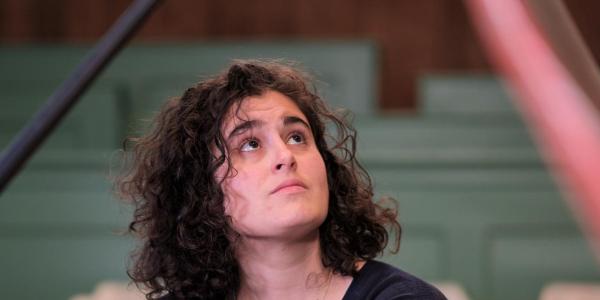
College of Music Dean Robert Shay and Associate Professor of Piano Pedagogy Alejandro Cremaschi attend the Equity and Excellence Award ceremony on April 22.
For the second year in a row, efforts to strengthen equal access and excellence within the College of Music are being recognized on the campus level.
On Wednesday, April 22, the 29th Equity and Excellence Award will be presented to one faculty, one staff, one undergraduate and one graduate student. And the faculty awardee is the Chair of the College of Music Diversity Committee, Associate Professor Alejandro Cremaschi.
“Equal access is an important aspect of education. It’s not only a social justice issue... it’s critical for students to have a diversity of culture, ideas and philosophy,” says Cremaschi.
Last year, Ethnomusicology Coordinator and Associate Professor Brenda Romero received the award.
Cremaschi, a piano pedagogy professor who hails from Argentina, was nominated by Dean Robert Shay, Professor and Dean Emeritus Dan Sher, Department of Musicology Chair Jay Keister and Professor of Double Bass Paul Erhard.
In each of their nominations, Cremaschi’s colleagues praised him for his accomplishments in his time with the diversity committee; he increased the number of Diverse Musicians' Alliance (DIMA) scholarship students from 14 to 23 in three years, advocated to create a teaching assistant position devoted to increasing diversity awareness and worked with Associate Professor of Violin Lina Bahn to bring African-American musical artist Pamela Z to the college for a residency.
“Thanks to Alejandro, students of color and first-generation college students in music have found a rich and more valued experience within the college,” says Sher in his nomination letter.
Erhard adds, “He is truly a selfless servant committed to creating a vibrant community of inclusiveness within the student body in the College of Music.”
For Cremaschi, promoting equity is a matter of course in a campus setting. “Diversity in education makes you a better person and a better citizen. You’re more open to new ideas and better able to engage different people,” he says.
Without that, according to Cremaschi, problems like those in Ferguson, Mo., arise. “Dialogue avoids dangerous situations.”
Reacting to—and encouraging—shifting populations
Cremaschi says the efforts of the College of Music and the CU Office of Diversity, Equity and Community Engagement (ODECE) are both responsible for and in response to a changing dynamic on campus.
In the past 10 years, according to the Office of Planning, Budget and Analysis, the percentage of students on the CU-Boulder campus who identify as minorities has grown from 13 percent to 20 percent; in the College of Music, it’s gone up from 11 to 18 percent.
Cremaschi says that growth is something to be proud of, especially because the obstacles to diversity in the College of Music are unique. “The audition itself creates a barrier. Lessons and instruments are costly, meaning fewer low-income students can compete.”
Fortunately, current efforts will have a ripple effect in the future. “More diversity among students now means more diversity among school teachers in the future. They’ll go to those inner-city school districts and teach music and have an impact there.”
Just the beginning
The strides made to promote inclusivity on campus aren’t an excuse to stop trying. “When you put diversity on the backburner, people forget. Especially musicians,” says Cremaschi. “We get caught up in practicing and we become color blind.”
Cremaschi says the college’s commitment to diversity—namely the creation of a diversity taskforce as part of the long-term strategic planning process now underway—ensures that that won’t happen.
Reaching out to low-income groups in the Boulder area to promote concerts, working with inner-city schools to put on workshops and teaching more diverse styles of music would help too, he says. “There’s still a lot of work to do.”
And leading that charge for a more diverse College of Music will be Alejandro Cremaschi.




